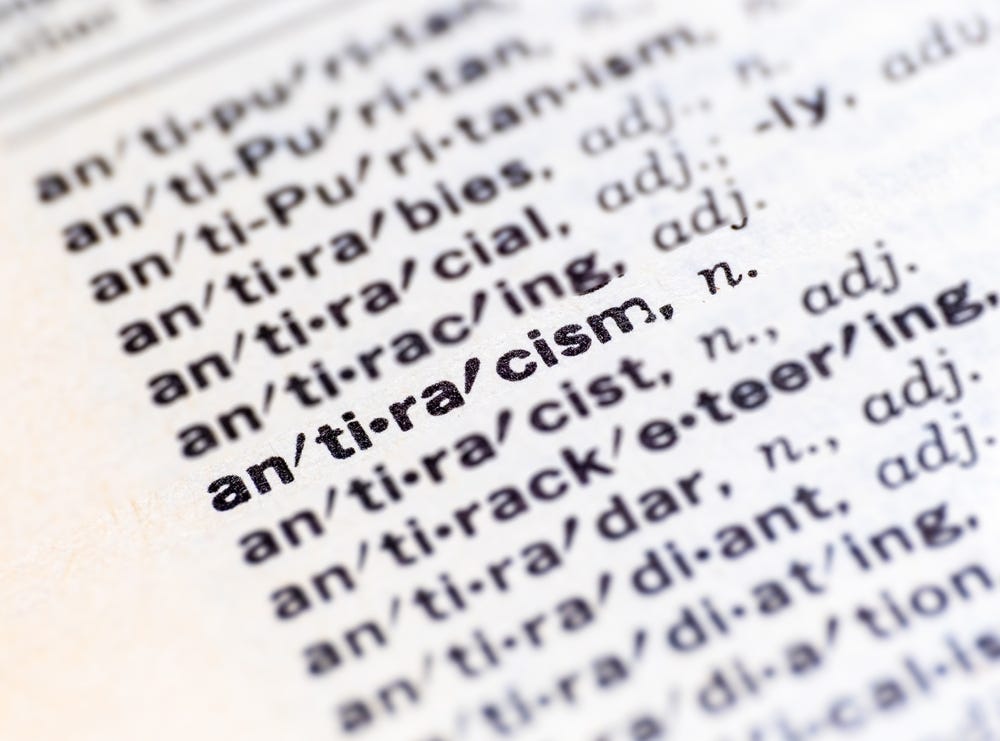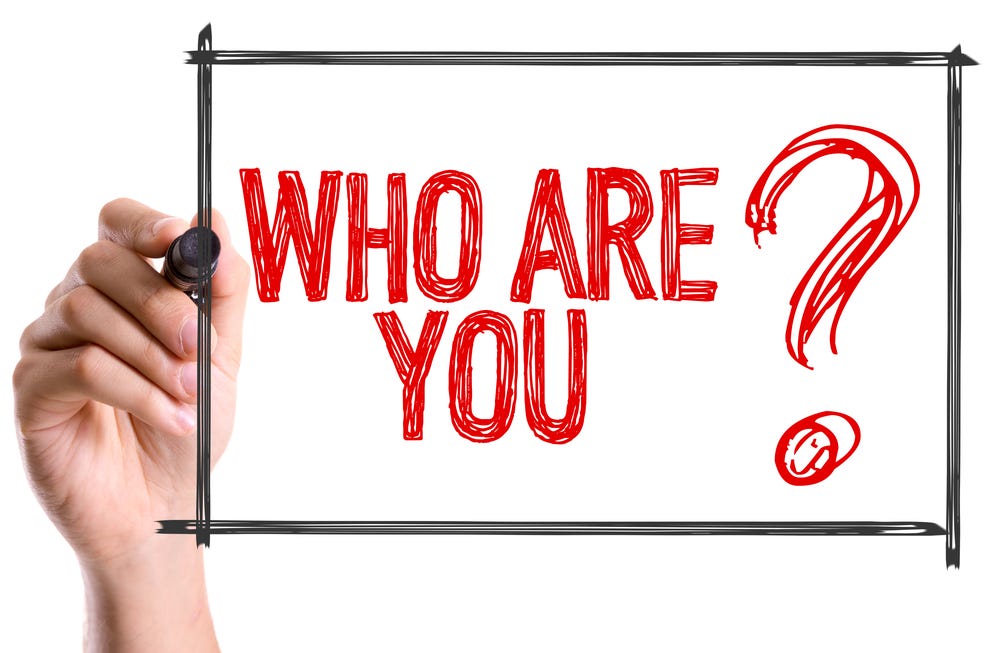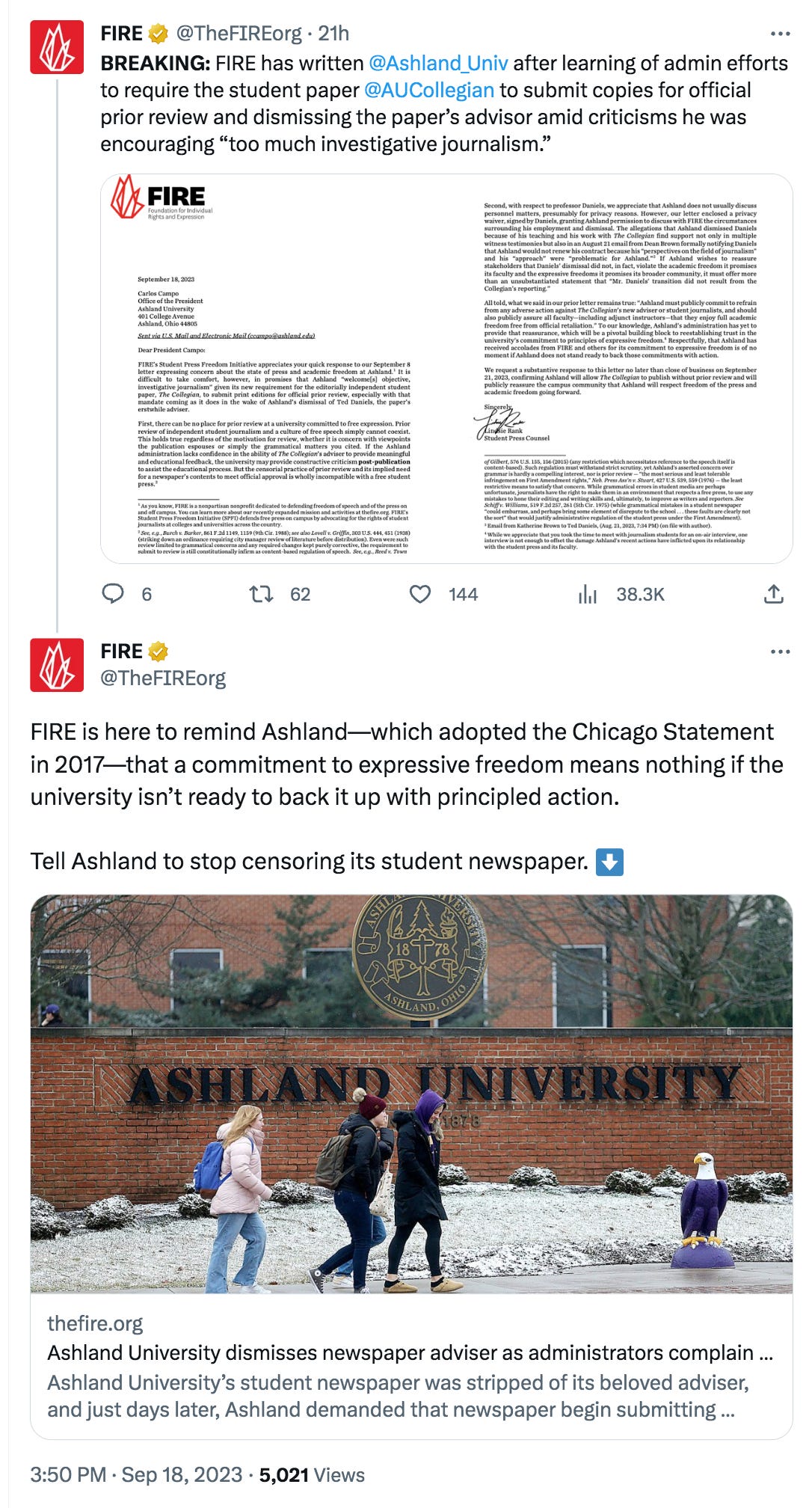E-Pluribus | September 19, 2023
Has woke peaked?; self-creation run amok; and the politics of COVID at the CIA.
A round-up of the latest and best writing and musings on the rise of illiberalism in the public discourse:
Ross Douthat: Is ‘Peak Woke’ Behind Us or Ahead?
The final item in Around Twitter (ok, “X”) below concerns a kerfuffle at Ibram X. Kendi's Center for Antiracism. Using this incident as a starting point, Ross Douthat of the New York Times goes on to examine the current state of the “woke” movement and concludes that it remains to be seen if the woke show is on the way out or if what we’ve seen so far is just a warm-up for what’s to come.
Yoel Inbar, a psychology professor. . . lost a potential job at the University of California at Los Angeles after a group of graduate students protested his opposition to requirements that academic job candidates detail their commitment to “diversity, equity and inclusion.” Professor Inbar, a political liberal, had dutifully filled out such a statement himself. But from the perspective of the graduate students, mere compliance was insufficient; his principled critique of the practice made him ideologically unacceptable.
[ . . . ]
There are two points to draw out of this situation. The first is about the present: Many free-speech-oriented liberals have been eager to pivot from worrying about an illiberal left to criticizing the excesses of red-state governors and school boards. But so long as bastions of liberal intellectual life are governed by ideological loyalty oaths, that pivot can only be partial, and Ron DeSantis and Greg Abbott can always point a finger back.
The second is about the future. In the Trump years we saw that in an atmosphere of political emergency, when fear of populism or authoritarianism organized every left-of-center thought, many liberals struggled to resist demands of ideological fealty made by movements to their left.
Now the emergency mentality has retreated, and resistance and skepticism are easier. But what if it comes back, whether under a Trump restoration or in some other form?
In that scenario, today’s entrenchment of ideological conformity surely bodes well for tomorrow’s would-be enforcers. If liberals accept loyalty oaths under calm conditions, what will they accept in an emergency? Probably too much — in which case the next peak of wokeness will be higher, the next revolution more complete.
Read it all.
Clare Coffey: To Thine Own Self Be True
At The Dispatch, Clare Coffey reviews a new book by Tara Isabella Burton entitled Self-Made: Creating Our Identities From Da Vinci to the Kardashians. While the focus on personal identity might seem at first a recent phenomenon, Burton explores how self-creation has evolved over the centuries to bring us to where we find ourselves today.
The subjects of Tara Isabella Burton’s latest sociological, theological, historical romp all enjoy and exploit this powerful process of self-creation, though on a grander and (mostly) less ridiculous scale. Her book Self-Made: Creating Our Identities From Da Vinci to the Kardashians begins with Renaissance artist Albrecht Dürer and ends with the titular pop culture phenoms. In between, Burton surveys personalities as big as Frederick Douglass, P.T. Barnum, Oscar Wilde, and Clara Bow, to list only a few. Though seemingly unrelated, each of the characters in this murderer’s row of modern achievement and eccentricity is united by the power of fashioning his or her own identity.
[ . . . ]
But there is a thesis in Self-Made that loosely structures this tour of history. The human person in the Middle Ages, Burton contends, was as fixed in his or her social sphere as the stars in the firmament. Identity comprised a set of concrete social facts: family, religion, occupation, village. It was revealed by God and constituted by where he had placed you. In the gorgeously taxonomizing medieval mind, a person was less a discrete phenomenon than a particular part of a whole. To question your place within the framework made as much sense as for a bolt to decide it was really a screw.
This framework persisted, in Burton’s telling, until the Renaissance, when it became possible for some to self-fashion their identity. “Genius” became a special class of person, and those lucky few endowed with it could self-anoint themselves aristocrats. With this first crack in the dyke, there was no going back.
Over time, two competing visions of self-creation spread, an old world account and a new world variant. The old world account was aristocratic, and sought to transpose the privileges of the old feudal order onto a new aristocracy of inborn genius through a kind of throwback logic. It believed in the divine right of kings (so to speak) but held—as in the case of the biblical David—that kings (or geniuses) are made by the mysterious elections of divine favor, as likely to descend upon a humble shepherd as a hereditary prince.
By contrast, the new world variant was entrepreneurial, less fixated on traditional aristocratic concerns of art, beauty, and martial glory. The new world’s paradigmatic slogan was, in the words of Frederick Douglass: “Work! Work! Work!” Burton adds of Douglass, “Work—the active, careful, willful cultivation of the self, was what made possible the stellar rise of America’s self-made men, ‘of whatever variety of race or color.’ It was, he heavily hinted, key to his own success.”
The new world mode of self-creation did not merely hold that the king can come from anywhere; it believed that anyone can be a king if he hustles hard enough. This tradition encompasses not only the radical striving of Douglass’ ascent from slavery, but the Gilded Age robber barons, the spiritual vaporings of New Thought self-help guides, and the indefatigable grifts of P.T. Barnum.
Read it all here.
John Ratcliffe and Cliff Sims: The CIA Politicizes Intelligence on China and Covid
Soon after the COVID-19 virus emerged from China, a strange coalition of government, science, and media agencies and organizations began running interference for the Chinese Communist government. Now a CIA whistleblower is alleging that CIA analysts were in effect bribed to slant their conclusions to that same end, write John Ratcliffe and Cliff Sims in the Wall Street Journal.
A Central Intelligence Agency whistleblower claims that the CIA rigged a report on the origins of Covid-19 to exonerate China. According to the allegation, the most senior member of a seven-member CIA analysis team “was the lone officer to believe COVID-19 originated through zoonosis.” His six colleagues thought the intelligence and science “were sufficient to make a low confidence assessment” that the disease came from a lab leak.
“The whistleblower further contends that to come to the eventual public determination of uncertainty, the other six members were given a significant monetary incentive to change their positions,” according to a Sept. 12 letter from two House committee chairmen.
[ . . . ]
[W]hen the intelligence community presented its March 2021 report on foreign election threats, the majority assessment was that China hadn’t sought to influence the 2020 race. Only one analyst disagreed. We knew of this conclusion while still in office and had seen the full body of intelligence, which seemed to show China participating in the same types of election-influence operations as Russia and Iran.
How could the majority view be otherwise? We were told the CIA simply didn’t believe there was evidence the Chinese government was behind these activities. But nobody can do anything in China without the consent of the Communist Party.
An investigation by the intelligence community’s analytic ombudsman got to the heart of the matter: “China analysts were hesitant to assess Chinese actions as undue influence or interference . . . because they tend to disagree with the [Trump] administration’s policies, saying in effect, ‘I don’t want our intelligence used to support those policies.’ ”
The ombudsman also found that “there were strong efforts to suppress” the view that China had sought to influence the election to hurt Mr. Trump, including by “CIA Management.” The dissenting analyst, Christopher Porter, wrote last year that when the Biden administration took over, it immediately removed election-threats analysis from his portfolio “because I had taken a dissent on the China influence issue.”
Read the whole thing.
Around Twitter (X)
Here’s Cornel West, on why he appears at speaking events with those with whom he differs on some issues. Via Steve McGuire and Pamela Paresky. (click for video)
Should student journalism be subject to review by a university’s administration before publication? The Foundation for Individual Rights and Expression (FIRE) says, no, not if the school wants to claim it supports free expression:
And finally, ex-staffers of Ibram X. Kendi's Center for Antiracism are accusing Kendi of committing an “act of employment violence” by letting staff go.













